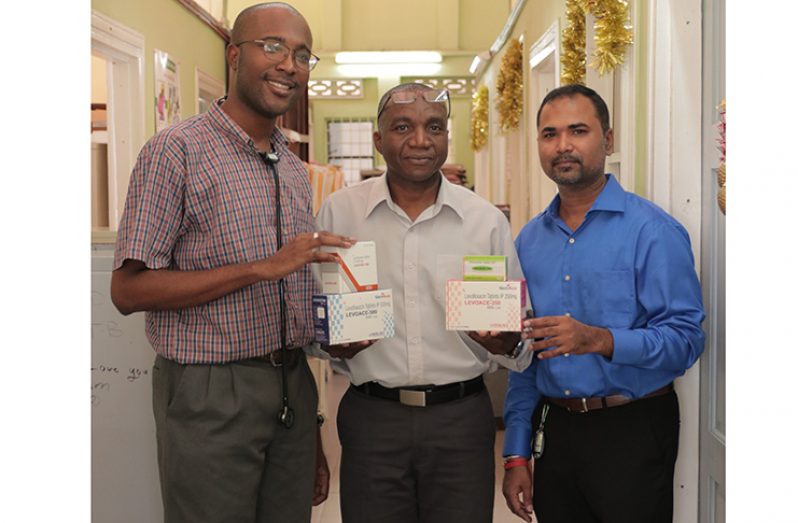–MoPH says there’s enough TB medication to last another year
THE Ministry of Public Health has confirmed that the rumoured shortage of one of the medications used to treat drug-resistant tuberculosis has been addressed.
The drug at reference is Ethionamide, one of four used in the treatment, which had been inadvertently out of stock, but according to the ministry in a statement there is no need to be alarmed as it is working assiduously on remedying the situation.
“All TB patients would be adequately treated,” said Director of Pharmacy Oneil Atkins.
Dr Jeetendra Mohanlall, Manager of the National TB Programme confirmed Friday that emergency supplies of the drug arrived this week and were dispensed to their patients.
Explaining the reason for the shortage, Dr Mohanlall said the National TB Programme has been looking around for quality second-line medication to address the problem of drug-resistance in their patients, but that due to some global challenges the delivery was unavoidably delayed.
This being the case, he said, they had to resort to sourcing emergency supplies, which took longer than expected to arrive.
The four second-line drugs currently used in their treatment regime, he said, are sourced from South Korea, Japan, India and Cyprus, through the Guyana Defence Force (GDF).
He, however, said that the emergency supplies that came in will be enough to treat all their patients for another year, and that this is the first time in four years that the ministry “has had a brief interruption” of one of the medications for patients.
According to Dr Mohanlall, the National TB Programme has made great strides in programmatic management of the multi-drug resistant TB (MDR-TB).
He said that not only is there a dedicated Focal Point Person in Dr Eshwar Ghanshiam, but that Guyana has implemented nine of the 10 recommendations made in 2016 by PAHO-WHO’s Green Light Committee.
He also pointed to the increase in screening to identify all possible drug-resistant TB patients here from 150 in 2014 to 1,540 in 2017.
Dr Mohanlall said that of the 2015 cohort of drug-resistant TB patients, 40 per cent successfully completed the two-year treatment. This figure climbed to 60 per cent in 2016.
The 2017 cohort of DR-TB patients is continuing treatment. Other strides in the sector include improving the management of patients. With this accomplishment, there needs to be more dedicated resources in the Direct Treatment Observe Short-course (DOTS) programme to do daily visits to patients, he said.
“Even doctors attached to the TB Programme visit patients in their homes with the mobile teams that are established,” he said.
He said TB patients generally have socio-economic challenges and they need psycho-social support in their management.
To strengthen his position, the National TB Programme Manager is strongly advocating boosting the social protection of these patients, whom he said are in line with the END TB Strategy.
Although Guyana has a 90 per cent coverage of DOTS. there are still many challenges presented by defaulting patients such as drug addicts, the homeless and the internal migrant population such as miners and loggers.
In 2017, it was observed that a fifth (20 per cent) of the TB patients also habitually abuse drugs and alcohol.
“These can be difficult to manage under the DOTS strategy and there are some who need to be in specialised-care facilities such as the TB Step Down Care Unit set to be commissioned in the first quarter of 2019,” Dr Mohanlall said.




.png)









